
|
 |
 |
by Peter Tyson March 25, 1999 I had just finished sending my latest dispatch by satellite phone around 11 o'clock last night when Julia Cort, producer of "Obelisk II" and leader of our effort, came into my room, looking as exhausted as I've ever seen her. "We're calling it off," she said. Our attempt to raise the obelisk was over, at least for now. Later, Mark Whitby succinctly stated the reason why we halted: "We went from a situation of relatively low risk to one of fairly high risk, with serious safety implications. To go forward would be negligent."
I walked around the site, trying to gauge how people felt about the project. The range of feeling was surprising.
The engineers, who had designed the attempt over many months, were palpably disappointed. But being practical men, they were already thinking ahead. I found Whitby, the inveterate theorist, sitting in his suit at the quarry, brainstorming a possible sandpit method. His protégé Henry Woodlock told me that if he had a chance for another go, he'd opt for less planning and more execution. The foreman Abdel Aleem was only too happy to share his ideas for how to proceed with such execution (shift the pivot timber closer to the center of gravity, stick the obelisk's butt farther over the ramp end, include more braking ropes, etc.).
Personally, I keep going back to the archaeologist Reginald Engelbach's point that, whatever technique the ancients relied on to raise an obelisk, it must have been simple. To my admittedly untrained eye, our rig seemed somehow too complex. Hamada Rashwan was only half joking yesterday when he said, "Why don't you just use a crane?" Our modern technology could do the job straightforwardly; is there any reason to think the ancient Egyptians' technology would be, in its way, any more intricate? Many of our team members believe that with enough pullers, unlimited time, and a long enough ramp, anyone could raise an obelisk—and the pharaohs had all that.
If there is one thing I've gained out of this attempt, it's a redoubled respect for the ancient architects and what they accomplished. For me, their success invests obelisks like those at Karnak and Luxor temples with even more majesty and mystery than they held before. Even our humble obelisk holds a strange power. If, for now, its angle of repose happens to be horizontal, so be it. This unique amalgamation of stone, rope, wood, and creative teamwork is a work of art, and it should rest not as a monument to failure, but to the power of human aspiration. In fact, the difficulties of this week have only strengthened our resolve to return one day and find a way to raise this obelisk. Peter Tyson is Online Producer of NOVA. Obelisk Raised! (September 12) In the Groove (September 1) The Third Attempt (August 27) Angle of Repose (March 25) A Tale of Two Obelisks (March 24) Rising Toward the Sun (March 23) Into Position (March 22) On an Anthill in Aswan (March 21) Ready to Go (March 20) Gifts of the River (March 19) By Camel to a Lost Obelisk (March 18) The Unfinished Obelisk (March 16) Pulling Together (March 14) Balloon Flight Over Ancient Thebes (March 12) The Queen Who Would Be King (March 10) Rock of Ages (March 8) The Solar Barque (March 6) Coughing Up an Obelisk (March 4) Explore Ancient Egypt | Raising the Obelisk | Meet the Team Dispatches | Pyramids | E-Mail | Resources Classroom Resources | Site Map | Mysteries of the Nile Home Editor's Picks | Previous Sites | Join Us/E-mail | TV/Web Schedule About NOVA | Teachers | Site Map | Shop | Jobs | Search | To print PBS Online | NOVA Online | WGBH © | Updated November 2000 |
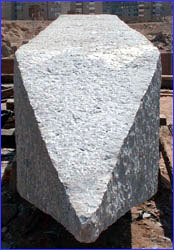 The NOVA obelisk before the attempt.
The NOVA obelisk before the attempt.
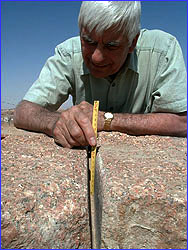 One of our successes: Denys Stocks measures the cut
made over 10 days by a copper saw, just what the
ancient Egyptians likely used.
One of our successes: Denys Stocks measures the cut
made over 10 days by a copper saw, just what the
ancient Egyptians likely used.
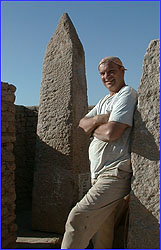 And another: Roger Hopkins poses next to his
sand-lowered obelisk.
And another: Roger Hopkins poses next to his
sand-lowered obelisk.
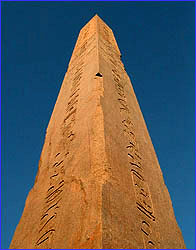 Hatshepsut's obelisk at Karnak Temple.
Hatshepsut's obelisk at Karnak Temple.
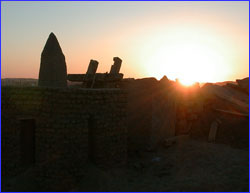 The sun sets on the two-ton obelisk.
The sun sets on the two-ton obelisk.